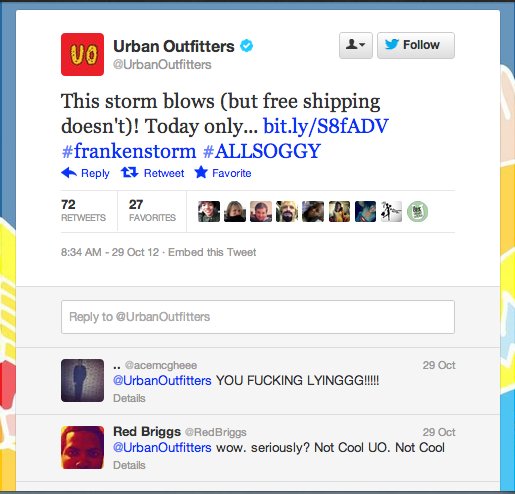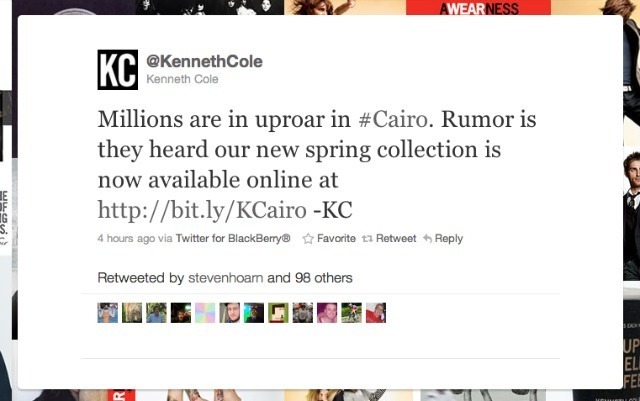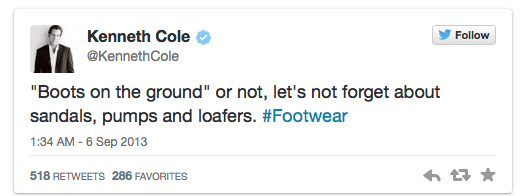Social media has become a powerful tool for businesses to deliver a message to its’ consumers. “Amplification” is one of the elements that are being created through social media (Forbes 2014). However, some of the ethical issues that they face may bring detrimental effects on the brand (Insider 2012). I believe that one of the most significant issues would be the exploitation of others’ misfortune.
These are just some of the unethical tweets where companies use to exploit the misfortune of others for the benefit of gaining publicity. I believe that this strategy undertaken by such companies should be avoided. Companies must be aware that the full control of their brand is no longer in their hands (Forbes 2014). The development of the Web has shifted the power of the brand to its consumers. Even though the “buzz” created may be strong, the brand may be tarnished.
Personally, I feel that it has become a norm for companies to adopt such strategy and only to “apologize” for their “insensitivity” later on. I believe that such occurrences will recur, as there is no law that governs the use of such “insensitive” stunts by companies. Despite the “backlash” some of these companies received from the digital sphere, they are still maintaining the same strategy:
Huffington Post (2013) reveals that Kenneth Cole explained that this was purportedly done to engage consumers. The company even hires a crisis management firm to deal with the “backlash” that it receives. The controversy that is built upon such inappropriate tweets have created the “buzz” and even boosted their company’s performance. It is indeed an upsetting trend.
This issue has clearly taught us that as powerful as how social media can be, some companies may exploit the most out of it regardless of ethics. Once a controversy is sparked, the “amplification” of such tweets may be endless. “#hasjustinelandedyet” is a prime example of such amplification. As we have discussed the issue of “authenticity” in the previous post, it is vital for businesses to understand this concept as well. I do uphold the belief as quoted by Simon Sinek (2009) that “people don’t buy what you do, they buy why you do it”. But when the question of ethics arises, companies will be questioned upon their morality.
References:
Bam, K.F., 2014. The true concept of “Authenticity.” Available at: https://bamsoton.wordpress.com/2014/12/04/the-true-concept-of-authenticity/ [Accessed December 4, 2014].
Forbes, 2014. The Explosive Growth Of Influencer Marketing And What It Means For You. Forbes. Available at: http://www.forbes.com/sites/kylewong/2014/09/10/the-explosive-growth-of-influencer-marketing-and-what-it-means-for-you/ [Accessed December 5, 2014].
HuffingtonPost, 2013. Kenneth Cole: Offensive Tweets Are Simply Good Business Strategy. HuffingtonPost. Available at: http://www.huffingtonpost.com/2013/09/06/kenneth-cole-twitter_n_3881085.html [Accessed December 5, 2014].
Insider, B., 2012. The 9 Biggest Brand Fails Exploiting Hurricane Sandy. Business Insider. Available at: http://www.businessinsider.com/the-9-biggest-brand-fails-exploiting-hurricane-sandy-2012-11?IR=T&op=1 [Accessed December 5, 2014].
Sinek, S., 2009. TED: How great leaders inspire action. Available at: http://www.ted.com/talks/simon_sinek_how_great_leaders_inspire_action?language=en#t-188800 [Accessed December 4, 2014].
The Independent, 2013. PR executive Justine Sacco apologises after losing job over racist Aids “joke” provoked #HasJustineLandedYet Twitter storm. The Independent. Available at: http://www.independent.co.uk/news/people/news/pr-executive-justine-sacco-apologises-after-losing-job-over-racist-aids-joke-provoked-hasjustinelandedyet-twitter-storm-9020809.html [Accessed December 5, 2014].


